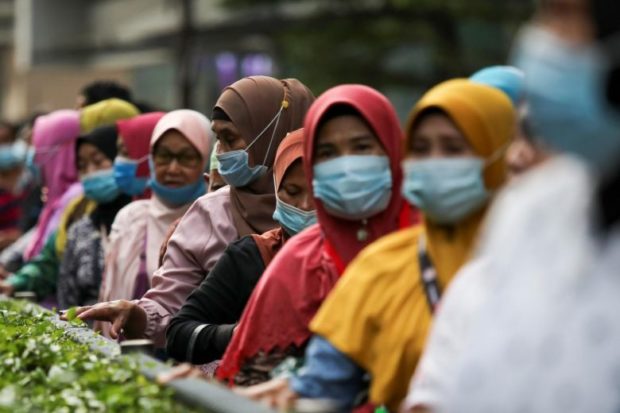Poor Malaysian households headed by widows, single moms struggle the most amid COVID-19 pandemic
KUALA LUMPUR — When Malaysia went into a partial lockdown in March because of a sudden spike of coronavirus cases, single parent Naimah Sudaian was left out of job with zero savings to survive the coming months.
With three children to raise, the 49-year-old was dumbfounded as to how she was going to afford rent and groceries after being laid off as a security guard that month.
“I remember going home that day, crying. I have no savings to get me going and with my last pay cheque of RM1,200 (S$394), I carefully planned our expenses,” Madam Naimah told The Straits Times.
“We had to ration our food and survive mostly on crackers and instant noodles. Occasionally, we would have rice and eggs because that is the cheapest ‘real meal’ we can afford,” she said.
She was not alone in struggling to make ends meet during the movement control order (MCO) to curb the spread of the coronavirus.
Article continues after this advertisementThe research of United Nations agencies found that households with family heads earning below RM2,000 a month tend to spend more on eggs (52 per cent) and instant noodles (40 per cent), and less on protein and rice, compared with those earning above the bracket.
Article continues after this advertisementWhen Malaysia first imposed movement curbs on March 18, it forced schools and non-essential businesses to temporarily shut down. People were confined to their homes except to buy food or essential items or to seek medical treatment.
These controls were eased on May 4, allowing most businesses to reopen and people to travel for work.
But despite life having returned to normal in most cases in Malaysia, the impact of the MCO has been damaging.
According to the UN study titled “Families On The Edge”, low-income households headed by women like widows and single mothers are among the worst affected, with higher rates of unemployment and a pessimistic outlook on prospects for recovery in the next six months.
And although there were various forms of government assistance given during the MCO, cash assistance was regarded as the most useful. The respondents also preferred sustainable assistance such as employment, and longer-term aids rather than just one-off cash handouts.
“Cash handouts help, but one-off assistance is not sustainable. In particular, they want jobs. So it is not a (culture of asking for government handouts),” Malaysia-based public policy research outfit DM Analytics managing director Muhammed Abdul Khalid told financial news site The Edge on Monday (Aug 24).
“They are very proud, responsible and rational people,” he added.
With a sample of 500 households with children in Kuala Lumpur’s low-cost flats, the research also revealed that the urban poor were forced to cut back spending on their children’s education by as much as 84 per cent.
Children living in these households are at risk of deteriorating dietary quality because of changes in their food consumption and a worsening of education outcomes due to challenges in accessing home-based online learning.
Furthermore, Unicef Malaysia social policy chief Stephen Barrett said, a large proportion of low-income children face more challenges when they eventually go back to school after the MCO.
“It is a known fact that hungry children do not learn properly. So there is a risk that low-income children may end up not going back to school,” Mr Barrett was quoted as saying by news site the Malay Mail Online.
“Coupled with the rising instances of child poverty and general malnutrition in Malaysia, Covid-19 will further exacerbate these disparities between lower-income households and their higher-income counterparts despite the efforts of the government to close these disparities,” he added.
As for Madam Naimah, she is doing odd jobs today, including washing dishes at a restaurant in Selangor. She gets about RM100 to RM300 a week, depending on luck.
Her three children, aged five, eight and 11, are not attending school for now. “The last thing I want is for them to get sick,” she said.
For more news about the novel coronavirus click here.
What you need to know about Coronavirus.
For more information on COVID-19, call the DOH Hotline: (02) 86517800 local 1149/1150.
The Inquirer Foundation supports our healthcare frontliners and is still accepting cash donations to be deposited at Banco de Oro (BDO) current account #007960018860 or donate through PayMaya using this link.
